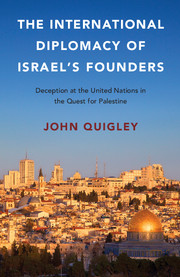 The International Diplomacy of Israel's Founders
The International Diplomacy of Israel's Founders Book contents
- Frontmatter
- Contents
- Preface
- A Note on United Nations Committees
- Abbreviations
- 1 A Public Relations Imperative
- 2 Promises, Promises
- 3 Pranks in Paris and Geneva
- 4 Courting the Commissar
- 5 Saving Europe's Jews – Our Way
- 6 Smoke and Mirrors at the YMCA
- 7 The Ship that Launched a Nation
- 8 Cocktails at the Consulate
- 9 Causing Chaos
- 10 Denying the Undeniable
- 11 A Peace-Loving State?
- 12 Joining the World with Fingers Crossed
- 13 Israel: 1, United Nations: 0
- 14 A Phantom Attack
- 15 Sabras in Sinai: Pardon My French
- 16 Suez Smoke-Screen
- 17 Mr. Nasser, Please Attack
- 18 Abba Eban's Finest Hour
- 19 Old Issues, New Lies
- 20 An Organization Turned Sinister
- 21 Prevarication Pays
- Notes
- Bibliography
- Index
11 - A Peace-Loving State?
Published online by Cambridge University Press: 05 January 2016
- Frontmatter
- Contents
- Preface
- A Note on United Nations Committees
- Abbreviations
- 1 A Public Relations Imperative
- 2 Promises, Promises
- 3 Pranks in Paris and Geneva
- 4 Courting the Commissar
- 5 Saving Europe's Jews – Our Way
- 6 Smoke and Mirrors at the YMCA
- 7 The Ship that Launched a Nation
- 8 Cocktails at the Consulate
- 9 Causing Chaos
- 10 Denying the Undeniable
- 11 A Peace-Loving State?
- 12 Joining the World with Fingers Crossed
- 13 Israel: 1, United Nations: 0
- 14 A Phantom Attack
- 15 Sabras in Sinai: Pardon My French
- 16 Suez Smoke-Screen
- 17 Mr. Nasser, Please Attack
- 18 Abba Eban's Finest Hour
- 19 Old Issues, New Lies
- 20 An Organization Turned Sinister
- 21 Prevarication Pays
- Notes
- Bibliography
- Index
Summary
The Soviet Union would be the Jewish Agency's most ardent supporter at the United Nations as the Jewish Agency pressed for acceptance of the statehood of Israel. The support would show when admission of Israel to the United Nations was requested. In September 1948, Moshe Shertok urged the provisional government to let him apply for membership for Israel. The provisional government agreed. Shertok chose November 29, the first anniversary of Resolution 181, to send a letter to Secretary-General Lie, signing it as Foreign Minister of Israel, and applying for the membership for Israel in the United Nations. Shertok wrote to Lie that Israel's admission to the United Nations would be “an act of international justice to the Jewish people.” So Shertok was justifying UN membership as a means of reparation for the Holocaust. It was a risky strategy, because he was putting Israel forward as a state that saw itself representing not only its present inhabitants, but a people scattered around the world. As an indication of Israel's consolidation as a state, Shertok recited in his letter that Israel had gained diplomatic recognition from nineteen states. Whether Israel could be considered a state in part of the territory of Palestine while UN mediation was still taking place was unclear, however.
An application for UN membership for Israel faced the further problem that the situation on the ground in Palestine remained unsettled. Military action was continuing. Armistices had yet to be concluded with the Arab states. A rival All-Palestine Government had been declared by an Arab administration in Gaza City in October 1948 and had proclaimed itself as the governing body of Palestine, to replace the departing British. So there was a rival claim to Palestine, one premised on the League of Nations mandate, which was supposed to lead, in principle, to a government for all of Palestine.
Making the situation more uncertain still for a membership application, the Israel Defense Force was not acting in ways that most UN member states considered necessary for peace. The IDF was on the offensive to chase out the Arab League forces that had intervened. The National Council had declared statehood by reference to Resolution 181, but the IDF was taking territory well beyond the lines drawn in that resolution.
- Type
- Chapter
- Information
- The International Diplomacy of Israel's FoundersDeception at the United Nations in the Quest for Palestine, pp. 105 - 119Publisher: Cambridge University PressPrint publication year: 2016


